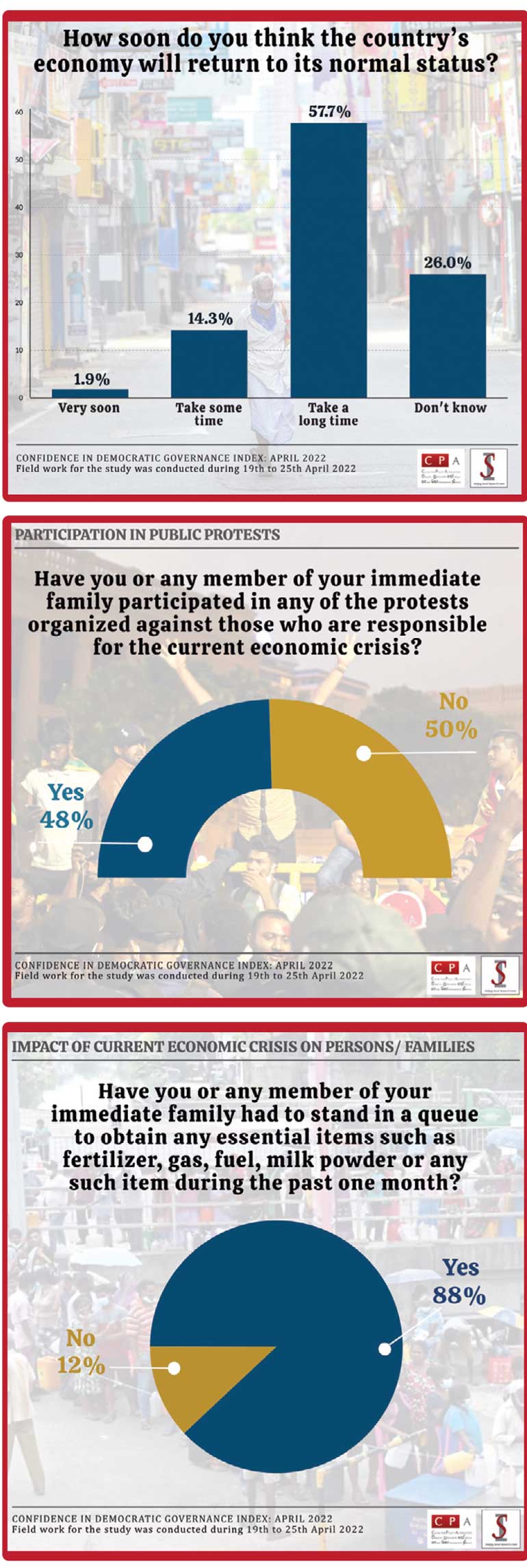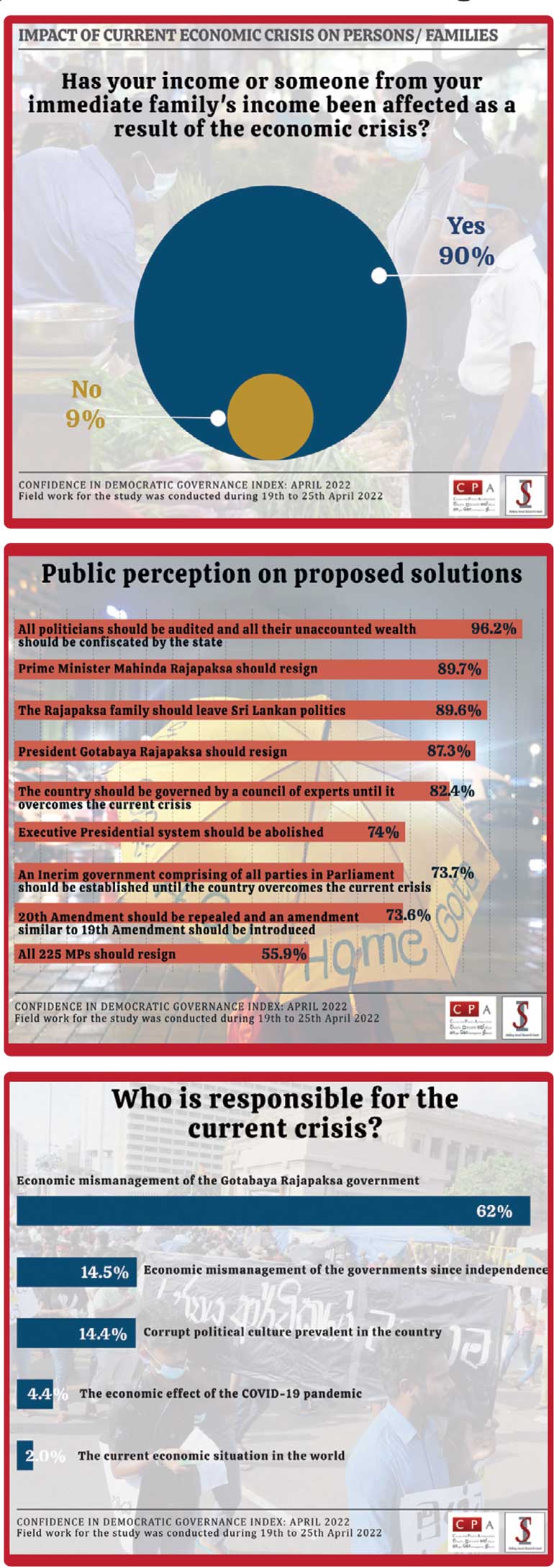Sunday Feb 22, 2026
Sunday Feb 22, 2026
Saturday, 30 April 2022 01:14 - - {{hitsCtrl.values.hits}}
A latest survey has confirmed widespread suffering and pessimism among masses countrywide with the blame squarely on the President Gotabaya Rajapaksa regime. People are also calling for an audit of the Members of Parliament and an end to the Rajapaksa family politics.
These are the findings of Confidence in Democratic Governance Index (Wave 2) conducted by Social Indicator (SI), the survey research arm of the Centre for Policy Alternatives. This scientific opinion poll aims to capture a snapshot of public experiences under the current crisis situation. Further, the poll also examines the causes for the crisis as well as the solutions to the crisis from the lenses of the Sri Lankan public. Given the fragile political condition, this survey was conducted within a very short period of time employing SI’s countrywide field network.
The findings send an unequivocal message to the Government that the current public outcry against the economic and political crisis in the country, is not limited to the protest sites in Galle Face, but is spread throughout the country amongst both men and women from all ethnic and economic groups. The survey findings show that an overwhelming majority of Sri Lankans have been affected by the current crisis. 88% of Sri Lankans claim that either they or a member from their immediate family have had to stand in queues to obtain essential items such as gas, fuel, milk powder, fertiliser etc. during the past one month.
Nine out of 10 Sri Lankans claim that either his or her income or the income of a member from their immediate family has been affected as a result of the economic crisis. The survey findings also reveal how this crisis has awakened public consciousness on democratic citizenship. Close to half of Sri Lankans – men and women equally, have taken part in at least one of the protest campaigns against those who are responsible for the plight of the Sri Lankan state.
Across the country people unanimously blame the Gotabaya Rajapaksa Government for the current financial crisis which is considered to be the worst crisis in post-independence Sri Lanka. 62% of Sri Lankans blame the economic mismanagement of the Gotabaya Rajapaksa Government – whilst 14.5% and 14.4% respectively, blame the economic mismanagement of Governments since independence and the country’s corrupt political culture.
This study tested public support towards some of the proposals put forward by various parties to address the current crisis. More than 96% of Sri Lankans believe that all politicians should be audited and all their unaccounted wealth should be confiscated by the State. Nine out of 10 Sri Lankans hold the opinion that Prime Minister Mahinda Rajapaksa should resign and that the Rajapaksa family should leave Sri Lankan politics. 87% support the demand that President Gotabaya Rajapaksa should resign.
Therefore, the survey clearly indicates that in people’s minds the Rajapaksa’s have no role to play in solving the crisis and removing them is seen as the way out of the current crisis. It is important to note that this view is harboured by all ethnic communities including the Sinhala majority who overwhelmingly voted for him three years ago.
There is clear public support for the other proposals such as, the country should be governed by the Council of Experts until it overcomes the current crisis, abolishing the Executive Presidency, establishing an interim Government comprising of all parties in Parliament and repealing the 20th Amendment and replacing it with an amendment similar to the 19th Amendment to the Constitution.
However, people seem to be cautious about the proposal that demands all 225 members of Parliament to resign. Only 56% of Sri Lankans support such a proposal. According to the survey findings, the support for those proposals does not vary significantly across different ethnic communities.
A significant majority of Sri Lankans express pessimism about their future. Only 2% believe that the country’s economy will return to its normal status soon – while 58% think it will take a long time and 14% think that it will take some time. A little over a quarter of Sri Lankans state that they do not know as to when the country’s economy will return to normalcy.
The Confidence in Democratic Governance Index (Wave 2) was carried out using a semi-structured questionnaire with 1200 sample respondents from the four main ethnic communities (Sinhala, Tamil, up Country Tamil, and Muslim). The sample distribution captured men and women from both urban and rural localities in all districts.
A multi-staged random stratified sampling technique was used to select the sample locations, and the respondents were selected using the snowball sampling technique within sample locations.
Field work for the national poll was conducted during 19 to 25 April 2022. The dataset was weighted in order to reflect the actual district and ethnic proportion of the population. The data set was analysed using the Statistical Package for Social Sciences (SPSS).

